Lesson Six: Imposing Liberalism
| Site: | MoodleHUB.ca 🍁 |
| Course: | Social 30-2 RVS |
| Book: | Lesson Six: Imposing Liberalism |
| Printed by: | Guest user |
| Date: | Wednesday, 31 December 2025, 5:05 PM |
1. Introduction
Imposing Liberalism
Issue Question: Is resistance to liberalism justified?
- appreciate Aboriginal contributions to the development of ideologie
- appreciate how citizens and citizenship are affected by the promotion of ideological principles
- appreciate that individuals and groups may adhere to various ideologie
- examine perspectives on the imposition (forced acceptance) of liberalism
- examine the extent to which modern liberalism is challenged by alternative ideas
- evaluate the extent to which resistance to liberalism is justified
Duration: 1 block (80 mins + homework)
Liberal ideology is being challenged constantly by many aspects of society, including Aboriginal collective thought, religious perspectives, extremism and environmentalism.
To impose liberal values means to force those values upon people or states without their permission or agreement. The imposition, or forced acceptance, of liberal ideology can occur when nations want to protect their self-interests or they want to promote liberal values for humanitarian purposes.
If a group of people or a nation of people does not agree with the imposition of liberal values because their ideology is different, should they be forced to change? How can liberalism involve imposition? These are the issues you will be considering in this lesson.
2
2. Lesson 4.6.1 The Aboriginal Experience with Liberalism
The Aboriginal Experience with Liberalism
Differences in ideological perspectives of the Aboriginal people and the Europeans led to conflict, misunderstandings, mistreatment, and abuses. The superiority that Europeans felt toward the Aboriginal peoples led them to attempt to assimilate the Aboriginals to the European perspective.
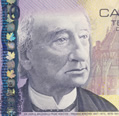
"The great aim of our civilization has been to do away with the tribal system and assimilate the Indian people in all respects with the inhabitants of the Dominion [of Canada] as speedily as they are fit for the change."
-Canadian Prime Minister John A. Macdonald, 1887The assimilation of Aboriginal peoples in Canada was the reason for the imposition of liberal ideology. The Aboriginal people of Canada have had liberal values imposed upon them by assimilation since their first contact with European
settlers.
"With the coming of the Europeans, our experience as a people changed. We experienced relationships in which we were made to feel inferior. We were treated as incompetent to make decisions for ourselves. Europeans would treat us in such a way as to make us feel that they knew, better than we ourselves, what was good for us."
-Georges Erasmus, a First Nations leader, 1977.from Erasmus, Georges. "We the Dene." in Mel Watkins. Dene Nation, The Colony Within. Toronto: University of Toronto Press, 1977.
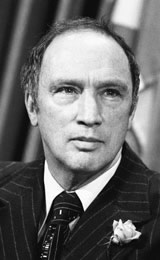
Prime Minister Pierre Trudeau, August 8, 1969
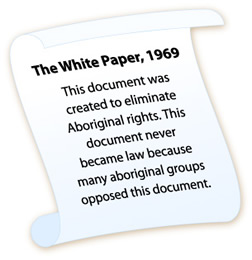
The White Paper
"It's inconceivable I think that in a given society, one section of the society have a treaty with the other section of the society. We must all be equal under the laws and we must not sign treaties amongst ourselves... We can't recognize aboriginal rights because no society can be built on historical "might-have-beens."
What point was Trudeau trying to make? ...that perhaps Aboriginal peoples, to be equal with other Canadians, need to become just like them; that is, they must assimilate.
The White Paper 1969
In government, a white paper is like a report or guide for making decisions. In 1969, the Canadian government led by Prime Minister Pierre Trudeau produced a White Paper by the Minister of Indian Affairs, Jean Chrétien, that proposed
-
the abolition of the Indian Act
-
the rejection of land claims
-
the assimilation of Aboriginal people into the Canadian population
Aboriginal people would then have the same status as other Canadian ethnic minorities. No longer would they be treated as a distinct group.
The Indian Chiefs of Alberta, in a response by Harold Cardinal, explained the widespread opposition to the White Paper. The National Indian Brotherhood issued a document titled Citizens Plus, which is more commonly known as the "Red Paper". After this response from the Aboriginal communities, Prime Minister Trudeau and the government began to back away from the White Paper.
Today, Aboriginal groups, along with the Canadian government, have been working toward resolving the issues created by assimilation.
In 2008, the Canadian government apologized formally for residential schools. The imposition of residential schools was an assimilation policy that forced 150 000 First Nations children into residential boarding schools that were far from their homes and in which the First Nations languages and cultural traditions were banned. Many survivors of the residential systems have said also that they were abused sexually and physically. The Roman Catholic Church operated about 75 per cent of the residential schools from the 1870s to the 1970s.

Visit the CBC Digital Archives to understand more about
A Lost Heritage: Canada's Residential Schools
In April 2009, Phil Fontaine, National Chief of the Assembly of First Nations, with a delegation of other Aboriginal peoples from Canada, attended Pope Benedict's weekly general audience in Saint Peter's Square at the Vatican City in Rome, Italy. Fontaine and the delegation later met the Pope to discuss abuses inflicted on Aboriginal children at residential schools in Canada operated by the Roman Catholic Church.
History has shown Canadians that the imposition of liberal ideology on Aboriginal peoples has affected the First Nations, Métis, and Inuit in many ways. As settlers came to Canada, greater efforts were made by government to impose liberal ideology on Aboriginal peoples. Differences in beliefs and values led to conflicts over land ownership. Government attempts at assimilating Aboriginal peoples into the mainstream were abusive and destructive, and assimilation limited Aboriginal peoples' freedom and control over their own lives. Trudeau's White Paper of 1969 continued the efforts to absorb Aboriginal peoples into the mainstream culture by trying to create a "just society" and to disregard treaty agreements and Aboriginal land claims.

Understandings of Ideologies
To Learn More About Aboriginal Experiences with Liberalism
Read "Aboriginal Experiences of Liberalism" on pages 219-230 of your textbook, Understandings of Ideologies. These pages will further your understanding of the Aboriginal perspective on the imposition of liberalism.
3. Lesson 4.6.2 Imposing Liberalism in Other Countries
Countries such as the United States have imposed their foreign policies on governments of other countries by trying to develop liberal ideologies within those countries.
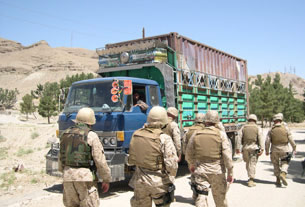 © Lexy Sinnott/shutterstock |
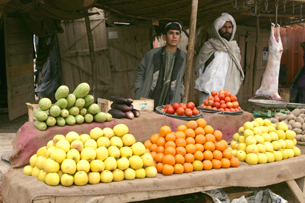 © Cpl. Pete Thibodeau, U.S. Department of Defense |
|---|
 |
Can one political ideology work for everybody? Can liberalism be an ideology that can work for all people in the world? Imposing liberal ideology around the world is complex because any ideology must be able to adapt to the culture, history, and ways of the people. |
|---|
Self-Interest and Humanitarianism
A country may try to impose liberal ideology on people in another country for two reasons: self-interest and humanitarianism.
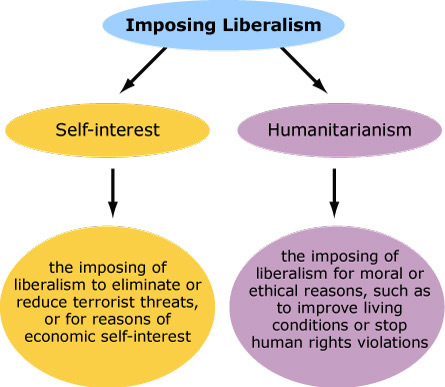
4. Conclusion
Liberal democratic nations have imposed liberal ideology to protect themselves from possible attack or to protect their own economic interests. Liberal ideology is also imposed for humanitarian reasons. Imposing liberal ideology is intended to bring equality and stability, as well as improve citizens quality of life. It is not always easy nor is it always successful.